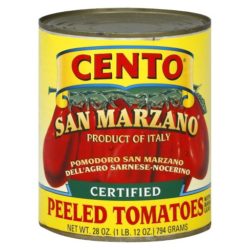Top Class Actions’s website and social media posts use affiliate links. If you make a purchase using such links, we may receive a commission, but it will not result in any additional charges to you. Please review our Affiliate Link Disclosure for more information.

Plaintiff Ricardo Sibrian originally filed his class action against Cento Fine Foods in February 2019, claiming that the company attempts to pass lower quality tomatoes off as San Marzano tomatoes.
On July 5, Sibrian amended his complaint to include additional information about the DNA testing of Cento “San Marzano” tomatoes.
San Marzano Tomatoes: Overview
San Marzano tomatoes originate from the Italian Peninsula, specifically in the rich volcanic soil found in the shadow of Mount Vesuvius. These tomatoes are fruits that have been dubbed “the most important industrial tomato[es] of the 20th century,” according to Amy Goldman’s The Heirloom Tomato.
The San Marzano tomato plant is an “indeterminate” tomato, meaning that it grows taller than “bush” tomatoes, requires more land, produces lower yields, and has a greater leaf cover.
These types of tomato plants require stakes or wire cages to support their vertical growth and need careful hand selection rather than harvesting using machines.
As a result of the special care required, San Marzano tomatoes are allowed to ripen longer to ensure “optimum flavor” and usually have far less bruising than other tomato varieties.
In the 1990s, the European community gave San Marzano tomatoes “protection designation of origin” status and established the Consortium of the San Marzano Tomato to help regulate the standards for San Marzano tomatoes.
In order for a tomato product to align with Consortium regulations, it must have the following qualities: firm flesh; high ratio of tomato flesh to water; fewer seeds than the average tomato; bittersweet taste; less water than the average tomato; a peel that dissolves easily; and products must be consistent across all cans.
These qualities make San Marzano tomatoes popular in creating sauce because they result in a thicker, richer sauce with a concentrated flavor.
Other regulations are more standard, including the need for an uniform red color, no foreign flavor/odor, absence of parasites, limited mold content, and a pH between 4.2 and 4.5.
The tomatoes are also characterized by an elongated shape, opposed to a round shape, although the shape of San Marzano tomatoes is only regulated in fresh versions of the fruit.
If the Consortium approves a tomato product based on these qualities, the product is given seals and a unique serial number to reflect the authenticity of the San Marzano tomato.
The Consortium reportedly has additional requirements regarding the processing of certified San Marzano tomatoes.
In order to comply with tomato regulations, manufacturers must make sure that “yield in terms of processed product is no more than 80%.” This means that, if a producer receives 100 kilograms (kg) of tomatoes, only 80 kg of this yield can be turned into San Marzano Tomatoes. These regulations help to ensure that any flawed tomatoes are not included in canned products.
Cento Tomatoes May Not Meet San Marzano Standards
Although Cento San Marzano tomatoes are labeled with Consortium seals, Sibrian claims that the tomatoes sold by the company are not actually San Marzano tomatoes. Sibrian references DNA testing allegedly done on Cento products in 2014 and 2019.
In 2014, seven seed samples of Cento San Marzano tomatoes were reportedly tested against the seeds of San Marzano certified tomatoes.
According to the analysis, none of the samples were genetically identical. Instead, the samples were reportedly between 60 and 85 percent similar.
In 2019, a similar analysis was carried out at the same laboratory. This testing reportedly analyzed six seed samples from Cento tomatoes against the standard of San Marzano tomato seeds.
Like in the 2014 testing, none of the samples were found to be genetically identical, according to the testing summary. These samples were allegedly between 65 and 80 percent similar to the certified seeds.
Sibrian claims that, because there are significant genetic differences between San Marzano seeds and Cento tomato seeds, they cannot be classified as true San Marzano tomatoes.
The Cento San Marzano class action also claims that the company fails to comply with Consortium regulations regarding the yield of their tomatoes.
Data from Consortium and Cento campaign reports show that Cento uses far more than 80 percent of their tomatoes to make products.
According to Sibrian, the Consortium harvested 9,803,315 kg of tomatoes and made 6,479,648 kg of canned San Marzano tomatoes. This represents a yield of 66 percent.
In contrast, Cento harvested 8,345,287 kg of tomatoes and turned this into 7,910,800 kg of finished San Marzano tomatoes for a yield of 95 percent.
“Defendant’s yield rate of 95% results in the inclusion of tomatoes of lower quality – less firm, bruised, irregularly shaped and disintegrating,” Sibrian claims in his Cento tomato class action lawsuit.
The inclusion of substandard tomatoes allegedly causes distinct differences between San Marzano tomatoes and Cento tomatoes. Whereas other San Marzano tomatoes remain firm and whole during the canning process, Cento tomatoes reportedly disintegrate and cause textural irregularities in the product.
Fraudulent Certification
Sibrian claims that Cento tomatoes are not certified as real San Marzano tomatoes by the Consortium and that, instead, “[Cento] labels imitate the labels of San Marzano Tomatoes which are certified by the Consortium even though the Products are not ‘San Marzano’ tomatoes.”
The Cento class action also states that Cento uses misleading markings on the bottom of their cans to mimic a proper certification.
Cento reportedly has their tomatoes certified through third party Agri-Cert. Although this company allegedly certifies Cento’s tomatoes “using the guidelines created to regulate San Marzano tomatoes in Italy,” Sibrian argues that Agri-Cert does not have the authority to approve Cento’s products as true San Marzano tomatoes.
Additionally, Sibrian argues that this is not the first time Cento has tried to circumvent San Marzano tomato regulations.
In 2011, the Carabinieri (Italian police) reportedly found that Cento, its importing subsidiary, and its supplier were in league with Giuseppe Napoletano to distribute fraudulent San Marzano tomatoes.
In May 2019, Napoletano was declared guilty although the statute of limitations saved him from serving his two year sentence.
In order to circumvent the certification process, Napoletano allegedly led certification agents on inspection tours through “false fields” that were not actually used to produce the used tomatoes. Cento’s tomatoes were allegedly certified by Napoletano as a part of this scheme.
Cento reportedly continues to deceive customers by portraying their products are true San Marzano tomatoes through packaging and labels.
“The labeling and appearance of the Products creates an erroneous impression that they contain San Marzano Tomatoes of equivalent quality to those bearing certification by the relevant body,” Sibrian argues in his Cento class action.
Sibrian claims that he and other consumers would not have purchased or paid as much for the Cento tomatoes if they knew that the products were not San Marzano tomatoes.
In his Cento tomato class action, Sibrian seeks to represent a Class of consumers who purchased Cento tomatoes.
The Cento San Marzano tomato class action lawsuit seeks injunctive relief, restitution, disgorgement, monetary damages, treble damages, punitive damages, interest, court costs, and attorneys’ fees.
Sibrian is represented by Spencer Sheehan of Sheehan & Associates PC and Michael R. Reese of Reese LLP.
The Cento Fine Foods San Marzano Tomatoes Class Action Lawsuit is Sibrian v. Cento Fine Foods Inc., Case No. 2:19-cv-00974-JS-GRB, in the U.S. District Court for the Eastern District of New York.
Read More Lawsuit & Settlement News:
Menards Class Action Says Customers Are Recorded At Return Counter
Recent Law To Benefit New Jersey Catholic Church Sex Abuse Victims
Whirlpool Agrees To $21M Leaky Refrigerator Class Action Settlement
Regions Bank Customers May Have Paid Too Much in the Early Mortgage Payoff Process
ATTORNEY ADVERTISING
Top Class Actions is a Proud Member of the American Bar Association
LEGAL INFORMATION IS NOT LEGAL ADVICE
Top Class Actions Legal Statement
©2008 – 2024 Top Class Actions® LLC
Various Trademarks held by their respective owners
This website is not intended for viewing or usage by European Union citizens.















205 thoughts onCento Fine Food Class Action Alleges Fake San Marzano Tomatoes
Add Me Please